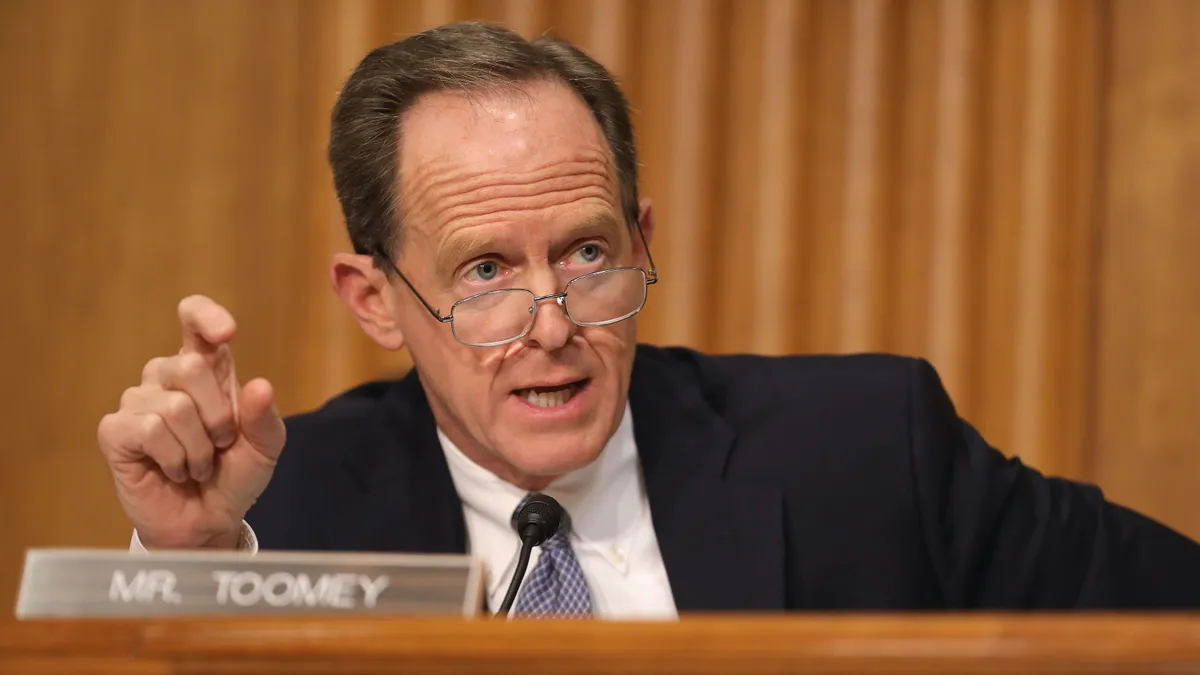It’s common, when packing for a vacation, to put a book in your suitcase and catch up on summer reading.
When you’re a member of Congress and the calendar turns to the traditional recess month of August, perhaps the catch-up activity is writing.
We saw it twice last week, with Sen. Elizabeth Warren, D-MA, asking the Office of the Comptroller of the Currency (OCC) to rescind three Trump-era pieces of crypto-related guidance, and to coordinate with the Federal Reserve and the Federal Deposit Insurance Corp. (FDIC) “to develop a comprehensive approach that adequately protects consumers and the safety and soundness of the banking system.”
A day later, Sen. Sherrod Brown, D-OH, and four other Democratic members of the Senate Banking Committee sent U.S. Bank CEO Andy Cecere a letter seeking more details surrounding the fake-accounts scandal that prompted the Consumer Financial Protection Bureau (CFPB) to fine the Minneapolis-based lender $37.5 million.
Written notices have continued this week. Eleven Republicans on the Senate’s banking panel wrote Fed Chair Jerome Powell on Tuesday, suggesting they would pursue legislation to force the central bank into more transparency and accountability to Congress. The letter, seen by Bloomberg, follows two salvos by Sen. Pat Toomey, R-PA, regarding what he sees as a lack of cooperation by the Fed.
First, Toomey said in June, the Federal Reserve Bank of Kansas City refused to answer questions regarding the process by which the fintech Reserve Trust gained a master account allowing it to move money through the Fed system without using a bank.
And second, Toomey said last week, the central bank revealed — in response to a Freedom of Information Act request from the American Accountability Foundation, a conservative group — that it has 12 pages of records relating to Reserve Trust and former Fed nominee Sarah Bloom Raskin, who once served on the fintech’s board.
“The fact that the Fed has been more responsive to an outside non-profit group than it has to members of the Senate committee that directly oversees it is outrageous,” the Republican senators wrote Tuesday. “Unfortunately, obstructionism has become too common a response from the Fed and regional Fed banks.”
Toomey told Bloomberg last week it’s “hard not to see this as a gesture of contempt for the Senate.”
The Fed has declined to release the 12 pages of records, citing exceptions to the Freedom of Information Act.
“They had this information,” Toomey said last week of the Fed, “which might very well inform our judgment about the qualifications of this nominee. And not only did they withhold it from us, they refused to even acknowledge they had it.”
In Tuesday’s letter, the 11 Republicans wrote, “In light of this persistent refusal to comply with reasonable requests for information, we have no choice but to pursue legislation that will compel these public institutions to be more transparent and accountable to Congress.”
The CFPB and Equifax
At least one leading House Democrat, too, is writing a banking regulator seeking action. House Financial Services Committee Chair Maxine Waters, D-CA, is asking the CFPB to stop credit-reporting firm Equifax from selling credit scores to lenders until the company can prove it’s able to ensure its scores are correct.
The letter, reported Wednesday by The Wall Street Journal, comes days after the Journal found Equifax sent out inaccurate credit scores tied to millions of loan-seeking U.S. consumers over a three-week span this year.
Waters, for her part, also wrote Equifax asking how many financial institutions received erroneous scores, how many consumers were affected and how the error occurred, the Journal reported.
And Waters wrote JPMorgan Chase, Wells Fargo and other banks asking whether they used the erroneous scores and how they are fixing the issue for harmed consumers, according to the outlet.
Equifax is “committed to responding to the letter transparently,” a spokeswoman for the company told the Journal.
Not every lawmaker is using the written word to signal change. Some are talking.
‘They have to listen to us’
"A new day is coming," Rep. Tom Emmer, R-MN, who serves on the House Financial Services panel’s oversight and investigations subcommittee, told Reuters this week.
Emmer is referring to Republicans’ chances to gain a majority of seats in the House after November’s election. Poll-tracking website FiveThirtyEight.com estimates the House has an 80% chance of flipping control, the wire service reported.
With that majority comes the ability to issue investigative subpoenas and compel public testimony.
House Financial Services Committee Republicans are planning to investigate two financial regulators — the CFPB and the Securities and Exchange Commission (SEC) — to determine whether the agencies have overstepped their authority, a dozen financial lobbyists, congressional staffers and lawmakers told Reuters.
"Once we have the power to subpoena, once they have to listen to us, aggressive congressional oversight will only strengthen our system of government,” Emmer told the wire service.
Among expected targets of upcoming probes include CFPB Director Rohit Chopra’s conduct in December, when he and now-Acting FDIC Chair Martin Gruenberg published a review of the FDIC’s bank merger policies without the approval of the agency’s then-chief, a Trump appointee.
Republicans also may look into a draft SEC rule requiring public companies to disclose climate-related risks, Reuters reported.






















